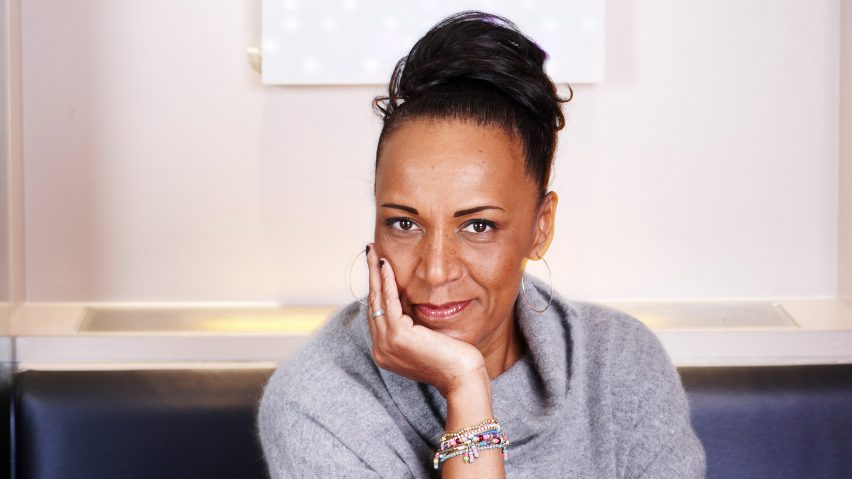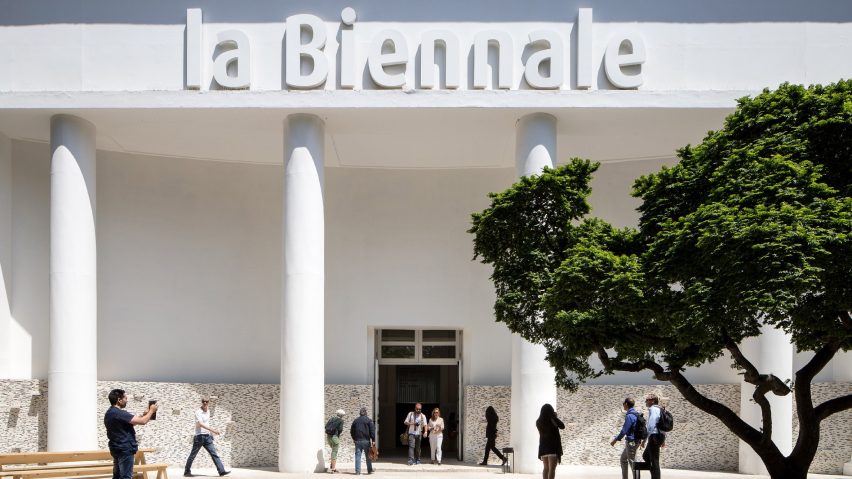
Africa a "powerful place from which to examine the issues that will dominate the next century" says Venice curator Lesley Lokko
Venice Architecture Biennale opens this week. In this exclusive interview, curator Lesley Lokko explains why she placed Africa at the heart of the festival for the first time.
Named Laboratory of the Future, this year's edition will see various interpretations and exhibits of themes including decolonisation and decarbonisation across the city of Venice.
Many of these will be examined through the lens of Africa – the continent with the world's youngest population – which Lokko has deliberately placed at the heart of the festival for the first time.
"For this exhibition, two keywords shaped practitioners' responses: decarbonisation and decolonisation," Ghanaian-Scottish architect Lokko told Dezeen.
"Africa's unique context, which is both richly challenging and richly creative, means it's a powerful place from which to examine the issues that will dominate the next century – climate change, societal change, demographic change, new forms of governance, explosive urbanity."

Lokko is the first person of African descent to have curated the Venice Architecture Biennale, which began in 1980. Cultural and racial identity is an important theme in much of her work.
By putting Africa at the fore, she aims to boost diversity at the event, which is the most significant in architecture. This year, more than half the biennale's 89 participants hail from Africa or the African diaspora.
Until now, the Venice Architecture Biennale has been consistently Eurocentric. In 2021, just one-third of participants were from outside of Europe and the USA, prompting calls for greater diversity.
"Without equal access to resources, it's challenging"
Among the participants at the main 2023 exhibition curated by Lokko are Pritzker Architecture Prize winner and Burkinabé-German architect Diébédo Francis Kéré, South African architect Sumayya Vally, Ghanaian-British architect David Adjaye and Kenyan architecture studio Cave_Bureau.
Meanwhile, this year's British Pavilion curators include Jayden Ali, Meneesha Kellay, Joseph Henry and Sumitra Upham, who are aiming to highlight the need for more inclusive architecture.
However, achieving this drastic improvement in diversity has been a challenge, Lokko said.
"Diversity also comes at a cost," she reflected.
"Without equal access to resources, it's challenging to come to the party. A huge amount of effort, energy and passion went into securing support, which is largely unseen and unrecognised," she explained.
Specifically, this includes gaining visas for her teams based in Ghana's capital Accra. Lokko said in a snippet of an email tweeted by Guardian architecture critic Olly Wainwright that they had been denied entry, with the Italian government accusing her of trying to bring "non-essential young men” into Europe.
"They have all been denied visas by the Italian government," she said in the snippet shared by Wainwright.
"The Biennale have done everything they possibly can to assist," she continued.
"This year's themes were very emotive and emotional"
According to Lokko, her aim for the 18th edition of the Venice Architecture Biennale is to reflect on the "unpredictability" of the turbulent era in which we are living and share solutions for it.
"All futures are uncertain. We do our best to anticipate the future," Lokko said.
"It's in that sense that I call this exhibition a ‘laboratory' — not the place of scientific, precise experimentation, but the messy, passionate, argumentative space of deeply human enquiry," continued Lokko.
"We are not aiming for a ChatGTP statement that is grammatically and politically tidy – rather the opposite. An exhibition that is full of the flaws and triumphs of any human endeavour."
Speaking of ChatGTP, an artificial intelligence (AI) chatbot, Lokko added that she was curious yet grateful to see that these technologies have not infiltrated this year's event – despite them making their presence known in the creative industries today.
"I think this year's themes were very emotive and emotional, not the kind of space in which AI easily thrives," she said. "Thankfully."
"The majority of exhibits are digital and drawn"
While improving the diversity of the event, this year's edition has also seen an increased focus on sustainability.
According to Venice Architecture Biennale's organisers, the event is aiming for carbon neutrality in alignment with the international standard PAS2060, which is currently the most widely recognised benchmark for carbon neutrality.
To achieve this, organisers have said the event has worked to reduce emissions under its own control and to offset the remaining emissions by purchasing certified carbon credits.
For Lokko, this meant she curated her exhibition to be "as light a touch as possible".
"The majority of exhibits are digital and drawn," she explained.
"Where artefacts and models were made, we worked tirelessly to reduce the impact by having things made locally, reducing shipping costs, and cutting down drastically on the teams required in Venice during installation."
Lokko, who is also an academic and novelist, was revealed as curator of the Venice Architecture Biennale for 2023 in December 2021. She is only the third woman to have taken up the role.
"Speaking to you from the world's youngest continent, I would like to thank President Cicutto and the entire team of La Biennale di Venezia for this bold, brave choice," said Lokko at the time.
Reflecting on her work on the event and its relevance today, she said believes that it remains to be a "vital" platform for the architecture industry.
"At a time when so much seems so precarious, I believe it's vital to have such moments, spaces, events, platforms," Lokko concluded.
"Events, and their consequences, unfold in ways that are often only predictable in hindsight," she continued.
"But there are other kinds of events – and large-scale exhibitions like La Biennale di Venezia are good examples – where, in full understanding of that unpredictability, curious people come together to share their ideas of what the future should be, what we should hope for, and how to achieve those hopes."
The portrait of Lokko is by Debra Hurford-Brown.
Dezeen is live reporting from the Venice Architecture Biennale, which takes place from 20 May to 26 November 2023. See Dezeen Events Guide for all the latest information you need to know to attend the event, as well as a list of other architecture and design events taking place around the world.
Dezeen in Depth
If you enjoy reading Dezeen's interviews, opinions and features, subscribe to Dezeen In Depth. Sent on the last Friday of each month, this newsletter provides a single place to read about the design and architecture stories behind the headlines.